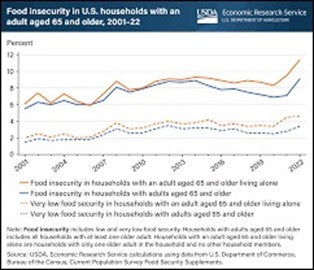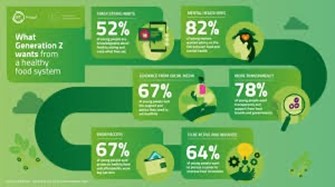Generational Consciousness
Generational Consciousness
By Sophie Cross
July 18, 2024

Growing up, I honestly paid very little attention to how the people around me handled their health and eating habits. I was only aware of this regarding myself around my senior year of high school. This is when many people around me started to talk about their lifestyles and eating choices, seeing that weight and body image slowly became a bigger part of our lives around this time. This coincided with the rise of wellness trends and social media, making it a substantial talking point and something was truly hard not to talk about. I felt like for the most part, everyone in my age group cared a good amount about their bodies and how they were fueling themselves. I really enjoyed this and the new openness to talk about these things, because it was motivating for me to see others being so healthy. I wanted to share that lifestyle and be a part of this community.
As I got more into my health, I grew a new awareness of the people around me. Starting to recognize people living their daily lives, and the trends of how different groups of people chose to eat and the exercise levels of others. Especially watching my parents and their habits more closely, I started to feel that I was almost doing too much, and maybe being too obsessive about wanting to live a healthier lifestyle. Eating out a lot, drinking a lot, and not really getting a lot of physical activity seemed to be normal to my parents and many of their friends. While my friends and I did these things as well, it was much more of a special occasion or weekend thing. This caused me to start reflecting on how my generation differs in the passion and awareness for health and why this is.
The first thing that I think caused this shift was the introduction of social media. With so many resources pushed in our faces at all times, it is hard not to at least try certain trends or diets that are promised to improve quality of life and happiness. The purchase of wellness products has skyrocketed and become a huge new market. Although many of the things promised aren’t actually accurate, it causes an innate awareness that's hard to get rid of. In a specific article, it is stated that 56% of Gen Z say that health is a very high priority in their life. Just moving through life with the knowledge that we have affects our choices and encourages a healthier way of thinking. Another important aspect of this is comparison to people online. When we open an app on our phone, it is almost guaranteed that we will be met with images of a super fit body, or someone doing activities that we all wish we were doing at the same time. I think that this brings a sense of encouragement and a need for us to strive for these things even if it's subconscious. Looking at our parents' generation or others ahead of us, there isn’t the same scale of media or screen time to obtain these same feelings. Especially when they were growing up, everyone was so much more concerned with just their own life, with no access to really analyze someone else from afar. There isn’t the same ingrained sense of competitiveness that there is now.
Growing up, I honestly paid very little attention to how the people around me handled their health and eating habits. I was only aware of this regarding myself around my senior year of high school. This is when many people around me started to talk about their lifestyles and eating choices, seeing that weight and body image slowly became a bigger part of our lives around this time. This coincided with the rise of wellness trends and social media, making it a substantial talking point and something was truly hard not to talk about. I felt like for the most part, everyone in my age group cared a good amount about their bodies and how they were fueling themselves. I really enjoyed this and the new openness to talk about these things, because it was motivating for me to see others being so healthy. I wanted to share that lifestyle and be a part of this community.
As I got more into my health, I grew a new awareness of the people around me. Starting to recognize people living their daily lives, and the trends of how different groups of people chose to eat and the exercise levels of others. Especially watching my parents and their habits more closely, I started to feel that I was almost doing too much, and maybe being too obsessive about wanting to live a healthier lifestyle. Eating out a lot, drinking a lot, and not really getting a lot of physical activity seemed to be normal to my parents and many of their friends. While my friends and I did these things as well, it was much more of a special occasion or weekend thing. This caused me to start reflecting on how my generation differs in the passion and awareness for health and why this is.
The first thing that I think caused this shift was the introduction of social media. With so many resources pushed in our faces at all times, it is hard not to at least try certain trends or diets that are promised to improve quality of life and happiness. The purchase of wellness products has skyrocketed and become a huge new market. Although many of the things promised aren’t actually accurate, it causes an innate awareness that's hard to get rid of. In a specific article, it is stated that 56% of Gen Z say that health is a very high priority in their life. Just moving through life with the knowledge that we have affects our choices and encourages a healthier way of thinking. Another important aspect of this is comparison to people online. When we open an app on our phone, it is almost guaranteed that we will be met with images of a super fit body, or someone doing activities that we all wish we were doing at the same time. I think that this brings a sense of encouragement and a need for us to strive for these things even if it's subconscious. Looking at our parents' generation or others ahead of us, there isn’t the same scale of media or screen time to obtain these same feelings. Especially when they were growing up, everyone was so much more concerned with just their own life, with no access to really analyze someone else from afar. There isn’t the same ingrained sense of competitiveness that there is now.


Another aspect that affects this study is the outlook on life in general. After many years, there is sometimes a decline in motivation and the will to focus on health as a main aspect of life. Especially with so many other stressors or things going on, I do think it can become easy to put this topic on the backburner, especially when it isn’t valued as highly to so many people. The way that we are set up as kids also plays a huge factor. When older generations were growing up, this topic wasn’t as much of a trend. I do think it is harder to adopt habits and prioritize foreign ideas after so many years of the same routine. The younger generation has the time and resources to make health a priority. This isn’t to say that we aren’t all dealing with our own life events that can make it hard to make health a sole focus, but that there is that freshness and positive outlook present to start these habits early. Being introduced early on and starting these habits often leads to lifestyle changes, so that when stressors are introduced, the healthy aspect of life still finds a way to be incorporated.
Another aspect that affects this study is the outlook on life in general. After many years, there is sometimes a decline in motivation and the will to focus on health as a main aspect of life. Especially with so many other stressors or things going on, I do think it can become easy to put this topic on the backburner, especially when it isn’t valued as highly to so many people. The way that we are set up as kids also plays a huge factor. When older generations were growing up, this topic wasn’t as much of a trend. I do think it is harder to adopt habits and prioritize foreign ideas after so many years of the same routine. The younger generation has the time and resources to make health a priority. This isn’t to say that we aren’t all dealing with our own life events that can make it hard to make health a sole focus, but that there is that freshness and positive outlook present to start these habits early. Being introduced early on and starting these habits often leads to lifestyle changes, so that when stressors are introduced, the healthy aspect of life still finds a way to be incorporated.


The Takeaway
The Takeaway
A big part of adopting a new lifestyle and way of thinking comes from observing others and how people are affected by their own actions. As a younger generation, seeing the amount of people affected by obesity and illness in our older peers can take a toll and encourage healthier habits. There is almost a 20% difference in the amount of people that care about their health between Millenials and Baby Boomers, blatantly showing these obvious results. The increased awareness of how we can be affected by what we eat and how much we exercise is likely a clear reason for this change. The new data of organic versus nonorganic food and the way that artificial ingredients affect our bodies is sure to make people take a step back and look at how food is affecting them. Based on research, 66% of Gen Z uses wellness and healthcare resources, compared to only 40% of older generations, leading to a whole new market and outlook on life. I think this is a really positive piece of information, and it feels good to be a part of a generation that is really taking all aspects of health into account.
A big part of adopting a new lifestyle and way of thinking comes from observing others and how people are affected by their own actions. As a younger generation, seeing the amount of people affected by obesity and illness in our older peers can take a toll and encourage healthier habits. There is almost a 20% difference in the amount of people that care about their health between Millenials and Baby Boomers, blatantly showing these obvious results. The increased awareness of how we can be affected by what we eat and how much we exercise is likely a clear reason for this change. The new data of organic versus nonorganic food and the way that artificial ingredients affect our bodies is sure to make people take a step back and look at how food is affecting them. Based on research, 66% of Gen Z uses wellness and healthcare resources, compared to only 40% of older generations, leading to a whole new market and outlook on life. I think this is a really positive piece of information, and it feels good to be a part of a generation that is really taking all aspects of health into account.


